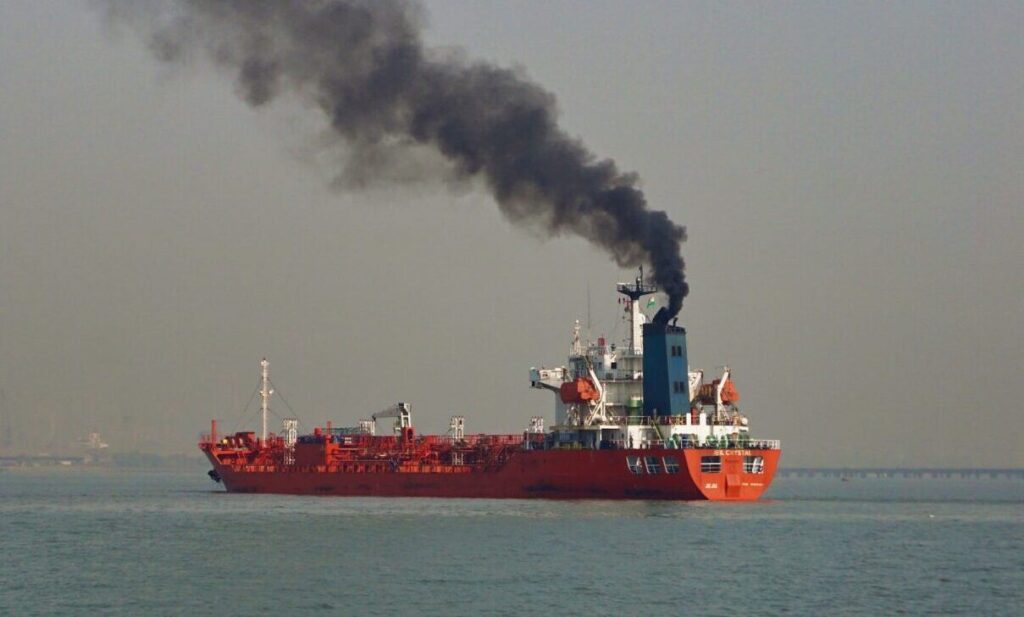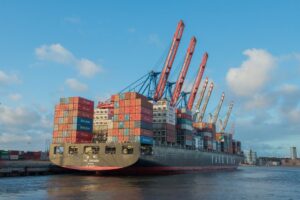COP28: Any Fossil Fuel Phase-Out Deal Must Include Global Shipping
Dec 13, 2023 | Pratirodh Bureau
Ships that burn heavy fuel oil emit dirty exhaust containing black carbon. These sooty particles supercharge global heating in polar environments and threaten the livelihoods of Arctic communities (Image by Cyprien Hauser via Flickr {CC BY-ND})
- If ocean shipping were a country, it would be the sixth-largest carbon emitter, eclipsing Germany, so the International Maritime Organization recently set targets to reduce shipping’s 1 billion tons of annual emissions in order to reach zero by 2050.
- International shipping accounts for about 2.2% of all global greenhouse gas emissions, plus 40% of all cargo carried by these ships is oil, gas, and coal, making shippers a key cog in the global fossil fuel supply chain.
- “I call on the COP presidency [to] include all global polluters in any agreement on phasing out fossil fuels, even those far out at sea,” a new op-ed states.
- This post is a commentary. The views expressed are those of the author, not necessarily of Mongabay.
Earlier this year, countries at the UN agreed to step up climate action on one of the world’s greatest polluters: global shipping.
The International Maritime Organization (IMO) set targets to reduce shipping’s 1 billion tons of annual emissions by 2030 and 2040, in order to reach zero by 2050. I had the opportunity to follow these negotiations myself and remind countries of their obligations to act on shipping under the Paris Agreement.
My message to the IMO in London a few months back stays the same as the COP unfolds in the UAE: hold shipping accountable for its shameful contribution to the climate crisis.
As a marine biologist who grew up in Mauritius, I know about the damage dirty shipping does to our climate, nature, and society—going well beyond just the greenhouse gases.
In 2020, a Japanese bulk carrier crashed on a coral reef near the coast of Pointe d’Esny, Mauritius’ precious wildlife hotspot and sanctuary, leaking more than 1,000 tons of oil in the protected area. Mangroves, coral reefs, sea turtles, fish, whales, and endemic birds were directly affected by what’s known as the worst-ever environmental disaster on our island, with local communities grappling to recover their livelihoods three years on.

Fishing, tourism and aquaculture, the main sources of income for families living on the coast, had to be suspended for a time or ceased completely. The Wakashio oil spill is a symptom of a much larger and more dangerous problem with the shipping industry: a recent report published by Seas At Risk shows that shipping’s impacts on seas and oceans have worsened over the past 50 years, despite IMO rules put in place to ensure the exact opposite.
Weak policies and poor enforcement undermine ocean health, with unprecedented rates of oil and chemical spills, underwater noise, sewage, plastics, and air pollution, as well as coastal degradation and marine wildlife extinction.
Shipping pollution also negatively impacts human health, though we may not realize it.
Approximately 250,000 premature deaths worldwide are caused by toxic pollutants from vessels every year, primarily in developing countries and communities of color. The first step to end this harm and destruction is by tackling the industry’s overwhelming dependence on fossil fuels.
Today’s ships are almost exclusively powered by the cheapest and dirtiest of fossil fuels, heavy fuel oil: a toxic, tax-free sludge that smells like burning rubber and looks like marmite. But it is not only what’s in the tank that’s the problem, it’s also what’s on the ships that needs addressing.
Astonishingly, 40% of all cargo carried on ships globally today is oil, gas, coal and other fossil fuels, making shipping a key culprit in our collective fossil fuel addiction. Getting ships away from using and transporting fossil fuels means no more devastating oil spills, no more breathing toxic air on ships or in ports and in surrounding areas, and ultimately no more fossil fuels altogether.
There are zero-emission energy alternatives and solutions available today to power the industry while cutting emissions. Wind-propulsion, slowing vessels down, and deploying 5-10% zero-emission fuels can cut fossil fuel consumption by nearly 50%, according to a recent study by CE Delft.
Crucially, this would not have significant impacts on the costs of global trade, a concern raised by countries that resist ambitious climate action at the IMO. Wind-assisted propulsion in particular is a no-brainer, with different types of modern technologies—like kites, sails, rigs, wings—ready for deployment on vessels today.
The IMO is now looking at policy measures that actually deliver the agreed emission cuts in the coming years, including a greenhouse gas levy and a green fuels mandate, to be adopted by 2025. The levy has the potential to generate billions of dollars in vital climate finance that could support climate resilience of vulnerable and developing countries—including Small Island Developing States (SIDS) such as Mauritius—while the fuels mandate could set minimum requirements for the use of zero-emission fuels on ships, stamping out dirty fuels from the sector for good.
This brings us back to COP28.
As governments are gearing up to push for a fossil fuels phase-out at the UAE, including shipping in this deal would give IMO member states a stronger mandate to strive for high ambition in its future policies, and transition ships to zero-emission in an equitable way. It would also give the industry a greater incentive and certainty to ramp up investments in alternative solutions today, which is what the IPCC says we urgently need.
I call on the COP presidency and the UN to not stall the progress made at the IMO a few months ago, and include all global polluters in any agreement on phasing out fossil fuels, even those far out at sea.
